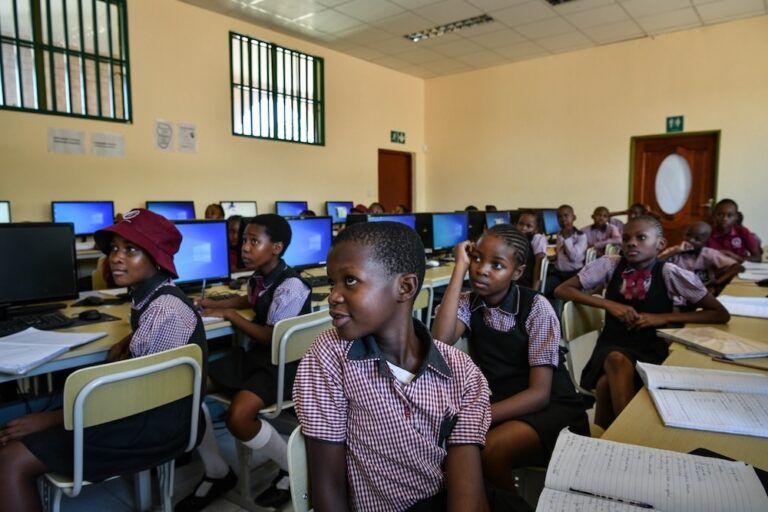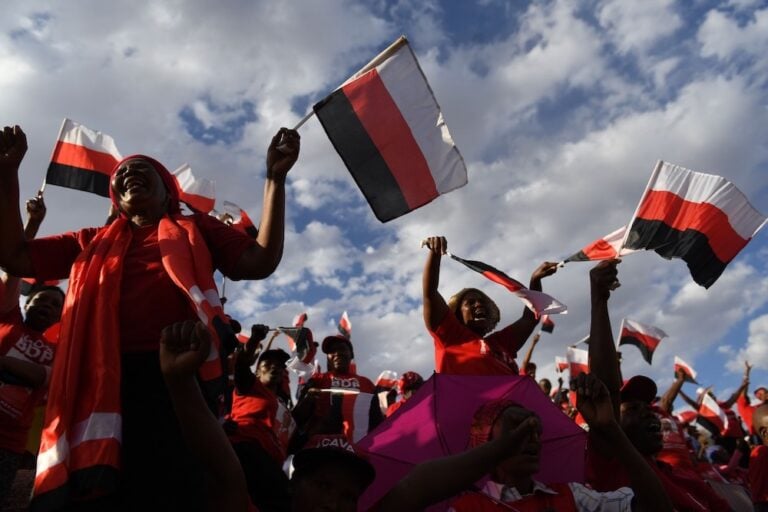(IFJ/IFEX) – The following is an IFJ media release, followed by IFJ’s 2 December 2001 letter to Botswana President Festus Mogae: December 3rd, 2001 World Journalists Condemn Botswana Over “Dangerous” Draft Media Law The International Federation of Journalists today warned that government plans for a Press Council in Botswana with extensive powers to impose fines […]
(IFJ/IFEX) – The following is an IFJ media release, followed by IFJ’s 2 December 2001 letter to Botswana President Festus Mogae:
December 3rd, 2001
World Journalists Condemn Botswana Over “Dangerous” Draft Media Law
The International Federation of Journalists today warned that government plans for a Press Council in Botswana with extensive powers to impose fines and jail terms on journalists and publishers were “dangerous, unworkable and could limit freedom of expression.”
“The Bill threatens to undermine efforts by media professionals to establish genuine self-regulation,” said IFJ General Secretary Aidan White. “The affairs of journalism and the ethics of our profession are best left to those with professional responsibilities. We urge the government of Botswana to withdraw this Bill in favour of a dialogue with journalists and media organisations. The way forward should be based upon international principles of self-regulation.”
The IFJ criticised the Bill for providing heavy penalties that are themselves ill-defined. “There is no sense of balance in penalties which range from fines of up to 5,000 Pula (around 1,000 US Dollars) and prison terms of up to 3 years. Such provisions amount to undue and unacceptable pressure on journalists and will be strongly opposed by the IFJ,” said Aidan White in a letter to the President of Botswana Festus Mogae.
The Bill provides for restrictive measures to license journalists. “These fail to recognise the fast-moving reality of journalism and will discriminate against journalists working as foreign correspondents,” says the IFJ.
The IFJ said the Bill was seriously flawed and called on the government to withdraw the draft and to meet media professionals who have been preparing a proposal for self-regulation in recent months.
“Instead of launching draconian laws, the government should undertake efforts to ensure that Botswana continues to respect international standards of press freedom,” said the IFJ.
The IFJ represents around 500,000 journalists in 106 countries.
The text of the letter follows:
His Excellency Festus Mogae
President of the Republic
Botswana
Gaborone
December 2nd 2001
Your Excellency,
Mass Media Communications Bill, 2001
I write to express the concern of the International Federation of Journalists, the world’s largest journalists’ group, over the proposal to enact a new law as set out in the Mass Media Communications Bill, which was submitted to the Botswana Media Advisory Council last month.
The IFJ has examined the contents of the Bill, which is similar in many respects to a previous proposal submitted in 1997, and we find that the new text contains a number of difficulties which, taken together, make it an unsafe, unworkable and potentially dangerous measure that could limit freedom of expression and opinion and apply undue pressure on the exercise of professional journalism in Botswana.
Our first concern is that the Bill could supersede efforts to create an instrument for genuine self regulation currently under discussion among publishers, editors and journalists in Botswana. We note that media representatives have been active over recent months finalising a proposal that will achieve the objective set out in this Bill “to monitor the activities of the press and ensure that high professional standards are maintained.” We strongly believe that this Bill should not undermine the process underway within media circles.
The affairs of journalism and the ethics of our profession are best left to those with professional responsibilities and we urge your government to withdraw this Bill in favour of a dialogue with journalists and media organisations. The way forward should, we believe, be based upon international principles of self-regulation.
If this is not done then the text as currently proposed will meet considerable opposition from colleagues both within Botswana and from the international media community.
The Bill, which is drafted in vague terms, contains contradictions in definitions of aims and objectives, and provides for heavy penalties that are themselves ill-thought out. There is no sense of balance in penalties which range from fines of up to 5,000 Pula and prison terms of up to 3 years. Such provisions amount to undue and unacceptable pressure on journalists and will be strongly opposed by the IFJ.
The Bill fails to define satisfactorily membership of the Council (will there be a list of journalists and publishers? If so, how will it be maintained and managed?).
Additionally, it is not at all clear how the operational framework will be applied. As set out here it will be heavily bureaucratic, impractical and unlikely to work efficiently. There are also serious questions over funding arrangements.
The suggested rules for accreditation of journalists fail to recognise the fast-moving reality of journalism in the modern world and would discriminate against journalists working as foreign correspondents.
An example of the vague and unclear nature of the text is in Part III, paragraph 16 which sets out the main objects of the Press Council. These contrast with the “functions” of the Executive Committee, the Councilâs governing body, in Part III, paragraph 22 under which the Committee charged with duties that, at first glance, are unworkable and inappropriate, i.e., “to ensure access to information”.
In all, the IFJ believes this text is seriously flawed and should not stand. As you know, a number of laws already regulate the work of journalists and media in Botswana. There are newspaper registration provisions already in force. The current laws of defamation are burdensome and should be reviewed. (It is not clear whether complainants will be able to sue for libel and, additionally, apply for redress to the Press Council as proposed.)
The IFJ and its member unions throughout the region of Southern Africa have long-campaigned for the principles of press freedom set out in the 1991 Windhoek Declaration on Media Independence and Pluralism to be put into effect in the region. Those efforts would be undermined if the Mass Media and Communications Bill 2001 is enacted.
We urge you to think again on this issue and to promote a positive dialogue between government and media professionals.
Yours Sincerely
AIDAN WHITE
General Secretary
Recommended Action
Similar appeals can be sent to:
His Excellency Festus Mogae
President of the Republic
Gaborone, Botswana
Please copy appeals to the source if possible.


